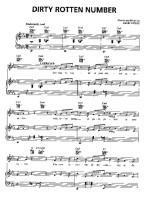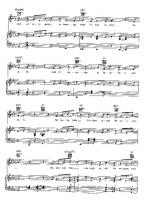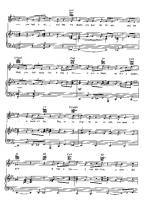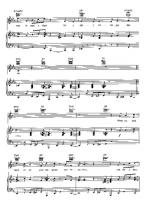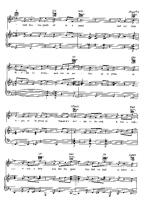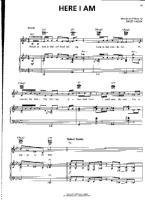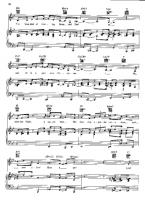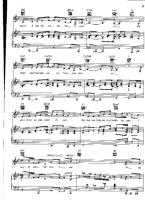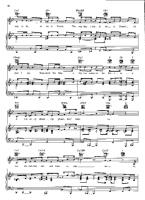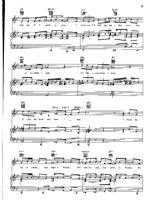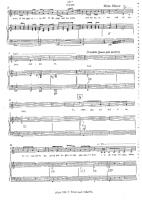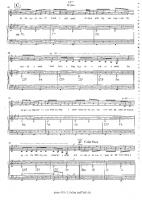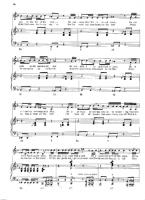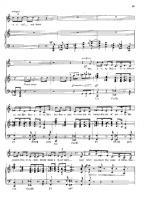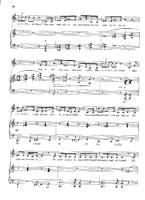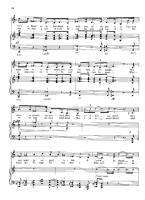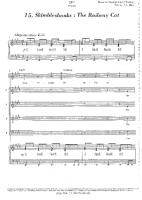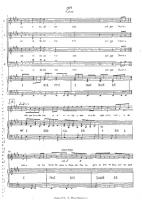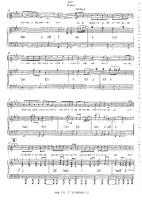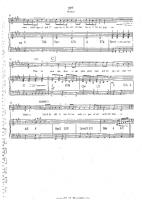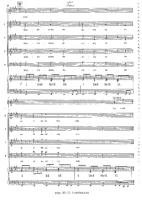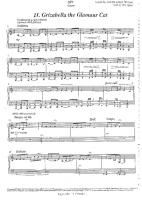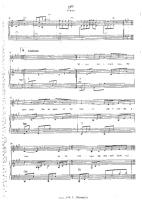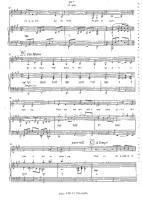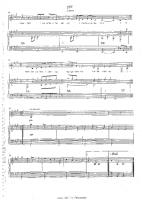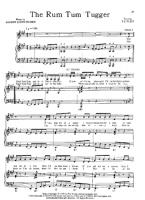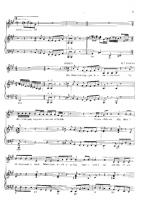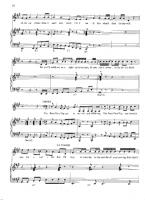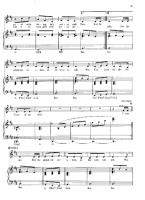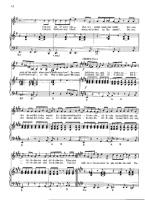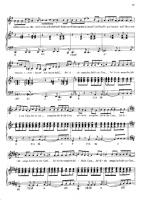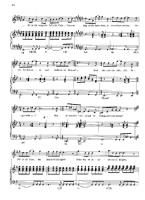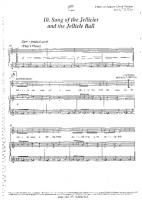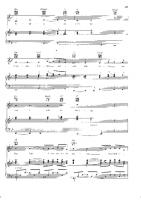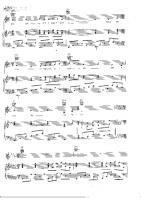Latest Sheets
Spring Awakening
 Spring Awakening is a Tony Award-winning rock musical with music by Duncan Sheik and book and lyrics by Steven Sater. The musical is based on the controversial 1891 German play of the same title by Frank Wedekind. Set in late-nineteenth century Germany, it concerns teenagers who are discovering the inner and outer tumult of sexuality. The original play was banned in Germany due to its portrayal of masturbation, abortion, rape and suicide. In the musical, alt-rock is employed as part of the folk-infused rock score. During the musical, characters sometimes break the fourth wall to express their motivations and desires directly to the audience.
Spring Awakening is a Tony Award-winning rock musical with music by Duncan Sheik and book and lyrics by Steven Sater. The musical is based on the controversial 1891 German play of the same title by Frank Wedekind. Set in late-nineteenth century Germany, it concerns teenagers who are discovering the inner and outer tumult of sexuality. The original play was banned in Germany due to its portrayal of masturbation, abortion, rape and suicide. In the musical, alt-rock is employed as part of the folk-infused rock score. During the musical, characters sometimes break the fourth wall to express their motivations and desires directly to the audience.After a number of workshops, concerts and rewrites over a seven-year period, Spring Awakening premiered Off-Broadway at the Atlantic Theatre Company on May 19, 2006 and ran through August 17, 2006. The show then opened on Broadway at the Eugene O'Neill Theatre on December 10, 2006 and received favorable reviews. Spring Awakening received eleven 2007 Tony Award nominations, winning eight, including Tonys for best musical, direction, book, score and featured actor. The show also won four Drama Desk Awards, including Outstanding Musical. The production is directed by Michael Mayer and choreographed by Bill T. Jones.
Dirty Rotten Scoundrels
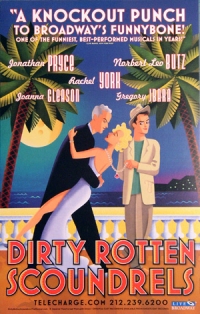 Dirty Rotten Scoundrels is a Broadway musical, with music and lyrics by David Yazbek and a book by Jeffrey Lane; it is based on the film of the same name. John Lithgow, Norbert Leo Butz, and Sherie Rene Scott played the lead roles at opening, with Joanna Gleason and Gregory Jbara also receiving above-the-title billing. The show premiered in San Diego, California on September 22, 2004, before moving to Broadway in January 2005 and officially opening in March. The show closed on Broadway on September 3, 2006 with a total of 666 performances. The Dirty Rotten Scoundrels: Original Broadway Cast Recording CD was recorded on March 14, 2005 at Right Track Studio in New York City and was released on May 10, 2005 by Ghostlight Records (an imprint of Sh-K-Boom Records).
Dirty Rotten Scoundrels is a Broadway musical, with music and lyrics by David Yazbek and a book by Jeffrey Lane; it is based on the film of the same name. John Lithgow, Norbert Leo Butz, and Sherie Rene Scott played the lead roles at opening, with Joanna Gleason and Gregory Jbara also receiving above-the-title billing. The show premiered in San Diego, California on September 22, 2004, before moving to Broadway in January 2005 and officially opening in March. The show closed on Broadway on September 3, 2006 with a total of 666 performances. The Dirty Rotten Scoundrels: Original Broadway Cast Recording CD was recorded on March 14, 2005 at Right Track Studio in New York City and was released on May 10, 2005 by Ghostlight Records (an imprint of Sh-K-Boom Records).A North American national Equity tour launched on August 4, 2006 with Tony Award-winner Norbert Leo Butz reprising his role as Freddy, alongside Tom Hewitt as Lawrence. The Equity tour wrapped on August 19, 2007. The 25-city non-Equity tour of the show, with Jamie Jackson as Lawrence and Doug Thompson as Freddy, debuted September 25, 2007 in Dayton, Ohio, with its final performance on March 23, 2008, in Memphis, Tennessee. International productions have opened in Tokyo, Mexico City, Madrid, Stuttgart, Seoul, Oslo, Stockholm, Tampere and productions are planned for Copenhagen, Reykjavik, and London.
Cats
 Cats is an award-winning musical composed by Andrew Lloyd Webber based on Old Possum's Book of Practical Cats by T. S. Eliot. The show has been performed around the world in numerous productions and has been translated into more than 20 languages. Cats has also been successfully made into a film recording.
Cats is an award-winning musical composed by Andrew Lloyd Webber based on Old Possum's Book of Practical Cats by T. S. Eliot. The show has been performed around the world in numerous productions and has been translated into more than 20 languages. Cats has also been successfully made into a film recording.
Into the Woods
 Into the Woods is an award-winning musical with music and lyrics by Stephen Sondheim and book by James Lapine. It debuted in San Diego at the Old Globe Theatre in 1986, and premiered on Broadway in 1987. Bernadette Peters' performance as the Witch, and Joanna Gleason's portrayal of the Baker's Wife, brought acclaim to the production during its original Broadway run. Into the Woods won several Tony Awards, including Best Score, Best Book, and Best Actress in a Musical (Joanna Gleason), in a year dominated by The Phantom of the Opera. The musical has been produced many times, with a 1988 national tour, a 1990 West End production, a 1991 television production, a 1997 tenth anniversary concert, a 2002 Los Angeles production and a 2002 Broadway revival.
Into the Woods is an award-winning musical with music and lyrics by Stephen Sondheim and book by James Lapine. It debuted in San Diego at the Old Globe Theatre in 1986, and premiered on Broadway in 1987. Bernadette Peters' performance as the Witch, and Joanna Gleason's portrayal of the Baker's Wife, brought acclaim to the production during its original Broadway run. Into the Woods won several Tony Awards, including Best Score, Best Book, and Best Actress in a Musical (Joanna Gleason), in a year dominated by The Phantom of the Opera. The musical has been produced many times, with a 1988 national tour, a 1990 West End production, a 1991 television production, a 1997 tenth anniversary concert, a 2002 Los Angeles production and a 2002 Broadway revival.Inspired by Bruno Bettelheim's 1976 book, The Uses of Enchantment, the musical intertwines the plots of several Brothers Grimm fairy tales and follows them further to explore the consequences of the characters' wishes and quests. The main characters are taken from the stories of Little Red Riding Hood, Jack and the Beanstalk, Rapunzel, and Cinderella, tied together by a more original story involving a Baker and his wife and their quest to begin a family, most likely taken from the original story of Rapunzel by the Brothers Grimm. It also includes references to several other well-known tales.
Cabaret
 Cabaret is a musical with a book by Joe Masteroff, lyrics by Fred Ebb, and music by John Kander. The 1966 Broadway production became a hit and spawned an acclaimed 1972 film as well as numerous subsequent productions.
Cabaret is a musical with a book by Joe Masteroff, lyrics by Fred Ebb, and music by John Kander. The 1966 Broadway production became a hit and spawned an acclaimed 1972 film as well as numerous subsequent productions.Originally entitled Welcome to Berlin, it is based on John Van Druten's play I Am a Camera, which in turn was adapted from the novel Goodbye to Berlin, by Christopher Isherwood. Set in 1929-1930 Berlin on the eve of the Nazis' rise to power, it focuses on nightlife at the seedy Kit Kat Klub and mostly revolves around the English 19-year-old cabaret performer Sally Bowles and her relationship with young American writer, Cliff Bradshaw. A sub-plot involves the doomed romance between German boarding house owner Fräulein Schneider and her elderly suitor Herr Schultz, a Jewish fruit vendor. Overseeing the action is the Emcee, who presides as master of ceremonies at the Kit Kat Klub and serves as a constant metaphor for the current state of society in Weimar Germany throughout the show.
Little Women
 Little Women is a musical with a book by Allan Knee, lyrics by Mindi Dickstein, and music by Jason Howland.
Little Women is a musical with a book by Allan Knee, lyrics by Mindi Dickstein, and music by Jason Howland.Based on Louisa May Alcott's classic 1869 semi-autobiographical novel, it focuses on the four March sisters - feisty, tomboyish, aspiring author Jo, romantic Meg, pretentious Amy, and kind-hearted Beth - and their beloved Marmee, at home in Concord, Massachusetts while the family patriarch is away serving as a Union Army chaplain during the Civil War. Intercut with the vignettes in which their lives unfold are several recreations of the melodramatic short stories Jo writes in her attic studio.
After 55 previews, the Broadway production, directed by Susan H. Schulman, opened on January 23, 2005 at the Virginia Theatre where, hampered by reviews ranging from lukewarm to abrasive, it closed after 137 performances.
The cast included Sutton Foster, Maureen McGovern, Janet Carroll, Jenny Powers, Megan McGinnis, Amy McAlexander, Danny Gurwin, Autumn Hurlburt and John Hickok.
A Chorus Line
 A Chorus Line is a musical about nineteen Broadway dancers auditioning for spots on a chorus line. The book was authored by James Kirkwood, Jr. and Nicholas Dante, lyrics were written by Edward Kleban, and music was composed by Marvin Hamlisch.
A Chorus Line is a musical about nineteen Broadway dancers auditioning for spots on a chorus line. The book was authored by James Kirkwood, Jr. and Nicholas Dante, lyrics were written by Edward Kleban, and music was composed by Marvin Hamlisch.With nineteen main characters, it is set on the bare stage of a Broadway theatre during an audition for chorus line members of a musical. The show gives a glimpse into the personalities of the performers and the choreographer as they describe the events that have shaped their lives and their decisions to become dancers.
The original Broadway production was an unprecedented box office and critical hit, receiving 12 Tony Award nominations and winning nine of them, in addition to the 1976 Pulitzer Prize for Drama. It ran for 6,137 performances, becoming the longest-running production in Broadway history up to that time. It still remains as the longest running musical whose first performance originated in the United States. The show has enjoyed many successful productions worldwide and was revived on Broadway in 2006.
Sweeney Todd: The Demon Barber of Fleet Street
 Sweeney Todd, the Demon Barber of Fleet Street: A Musical Thriller is a Tony Award-winning musical with a book by Hugh Wheeler and music and lyrics by Stephen Sondheim. The musical is based on the 19th century fictional character Sweeney Todd, though more specifically, the 1973 play Sweeney Todd, the Demon Barber of Fleet Street by Christopher Bond.
Sweeney Todd, the Demon Barber of Fleet Street: A Musical Thriller is a Tony Award-winning musical with a book by Hugh Wheeler and music and lyrics by Stephen Sondheim. The musical is based on the 19th century fictional character Sweeney Todd, though more specifically, the 1973 play Sweeney Todd, the Demon Barber of Fleet Street by Christopher Bond.Sweeney Todd opened on Broadway at the Uris Theatre on March 1, 1979 and ran for 557 performances. It was directed by Harold Prince with musical staging by Larry Fuller, and starred Len Cariou as Sweeney Todd and Angela Lansbury as Mrs. Lovett. The musical tells the story of Sweeney Todd, who was previously known as Benjamin Barker, who returns from Australia where he has spent fifteen years on false charges. When he learns from Mrs. Lovett, whose meat pies are the worst in London, that his wife poisoned herself after being raped by Judge Turpin (the man who wrongly imprisoned him), and that his daughter is the ward of the same Judge Turpin, he vows revenge.
A feature film adaptation of Sweeney Todd, jointly produced by Dreamworks and Warner Bros., was released on December 21, 2007. Tim Burton directed from a screenplay by John Logan. It stars Johnny Depp as Todd (Depp received an Oscar nomination and a Golden Globe award for his performance), Helena Bonham Carter as Mrs. Lovett, Alan Rickman as Judge Turpin, Sacha Baron Cohen as Signor Pirelli, Jamie Campbell Bower as Anthony Hope, Laura Michelle Kelly as The Beggar Woman, Jayne Wisener as Johanna, Ed Sanders as Toby, and Timothy Spall as Beadle Bamford.
Sondheim's score is one of his most complex to date, with orchestrations by his long-time collaborator Jonathan Tunick. It relies heavily on counterpoint and rich, angular harmonies. Its compositional style has been compared to those of Maurice Ravel, Sergei Prokofiev, and Bernard Herrmann (who scored Alfred Hitchcock films). Sondheim also quotes the ancient Dies Irae Gregorian chant, both as part of the eponymous ballad that runs throughout the score, later heard in a musical inversion, and in the accompaniment to "Epiphany". He also relies heavily on leitmotif - at least twenty distinct ones can be identified throughout the score. Depending on how and where the show is presented, it is sometimes considered an opera. Sondheim himself has described the piece as a "black operetta." An original Broadway cast recording was released in 1979. It included the Judge's "Johanna" and the tooth-pulling contest from Act I, which had been cut in previews.
Search for Free Sheet Music
You can make a search through the entire collection of sheets.
You can make a search through the entire collection of sheets.
Hi, fellow musicians!
There is no registration required to download the sheets but you can subscribe to our mailing list to get notified of new sheets.
There is no registration required to download the sheets but you can subscribe to our mailing list to get notified of new sheets.
Latest Artists
Bob Elgin
× 1
Freddie Mercury × 3
Katy Perry × 1
Wayne Hooper × 1
Lev Zemlinski × 1
Lennie Tristano × 1
Antonio Fragoso × 1
Craig Carnelia × 1
Avenue Q × 1
Berklee College Of Music × 2
Arcangelo Corelli × 1
Ludvig Van Beethoven × 1
Eric Whitacre × 1
Neftali Medina × 1
Bette Midler × 1
Vytauto Kernagio × 1
Mohammed Abdel Wahab × 1
The Mamas & the Papas × 1
Ah Doe × 3
Robert Fuchs × 1
Felix Blumenfeld × 1
Johannes Bernardus van Bree × 1
Guillaume Lekeu × 1
Weiss Kreuz × 1
The Daydream × 2
Max Richter × 1
Gilbert & Sullivan × 1
Luis MIguel × 1
Kenny Wheeler × 1
Louis Couperin × 2
Haroldo Lobo × 1
David Bonnin × 1
Billy Joel × 1
Johann Friedrich Fasch × 1
Shakira × 1
Inuyasha × 1
Michel Polnareff × 1
Alberto Nepomuceno × 1
Daniel Moretti × 1
Michael W. Smith × 1
Emilie Autumn × 1
Nightwish × 1
Michael Kooman × 1
Fergie × 1
bijan mortazavi × 1
U2 × 1
Michael Kamen × 1
Bart Howard × 1
Georges Moustaki × 2
Acid Black Cherry × 1
Freddie Mercury × 3
Katy Perry × 1
Wayne Hooper × 1
Lev Zemlinski × 1
Lennie Tristano × 1
Antonio Fragoso × 1
Craig Carnelia × 1
Avenue Q × 1
Berklee College Of Music × 2
Arcangelo Corelli × 1
Ludvig Van Beethoven × 1
Eric Whitacre × 1
Neftali Medina × 1
Bette Midler × 1
Vytauto Kernagio × 1
Mohammed Abdel Wahab × 1
The Mamas & the Papas × 1
Ah Doe × 3
Robert Fuchs × 1
Felix Blumenfeld × 1
Johannes Bernardus van Bree × 1
Guillaume Lekeu × 1
Weiss Kreuz × 1
The Daydream × 2
Max Richter × 1
Gilbert & Sullivan × 1
Luis MIguel × 1
Kenny Wheeler × 1
Louis Couperin × 2
Haroldo Lobo × 1
David Bonnin × 1
Billy Joel × 1
Johann Friedrich Fasch × 1
Shakira × 1
Inuyasha × 1
Michel Polnareff × 1
Alberto Nepomuceno × 1
Daniel Moretti × 1
Michael W. Smith × 1
Emilie Autumn × 1
Nightwish × 1
Michael Kooman × 1
Fergie × 1
bijan mortazavi × 1
U2 × 1
Michael Kamen × 1
Bart Howard × 1
Georges Moustaki × 2
Acid Black Cherry × 1






























































































